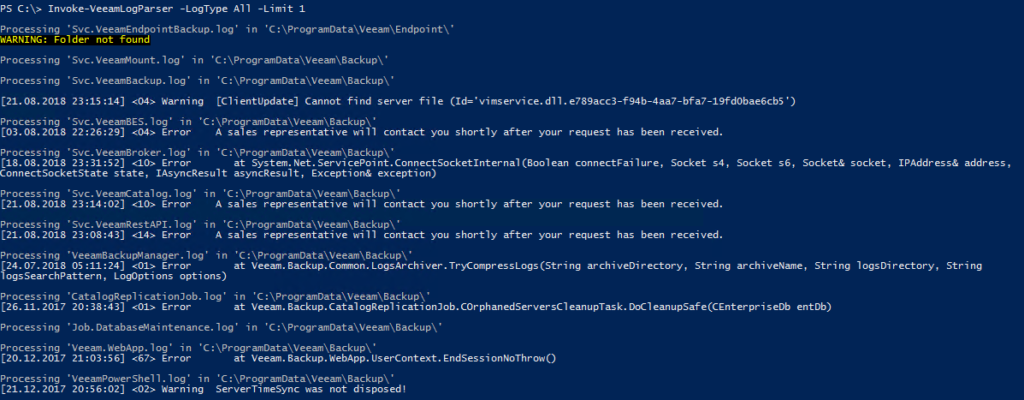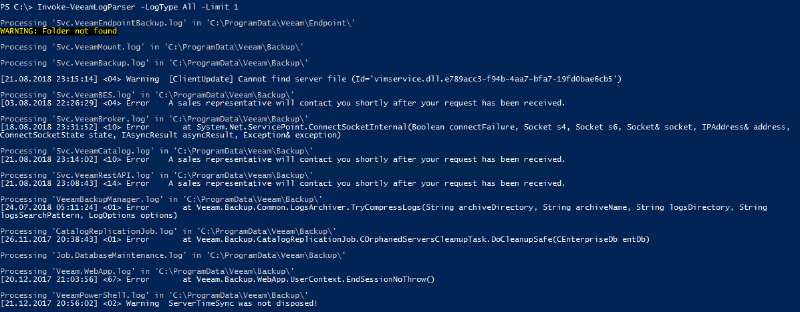1
2
3
4
5
6
7
8
9
10
11
12
13
14
15
16
17
18
19
20
21
22
23
24
25
26
27
28
29
30
31
32
33
34
35
36
37
38
39
40
41
42
43
44
45
46
47
48
49
50
51
52
53
54
55
56
57
58
59
60
61
62
63
64
65
66
67
68
69
70
71
72
73
74
75
76
77
78
79
80
81
82
83
84
85
86
87
88
89
90
91
92
93
94
95
96
97
98
99
100
101
102
103
104
105
106
107
108
109
110
111
112
113
114
115
116
117
118
119
120
121
122
123
124
125
126
127
128
129
130
131
132
133
134
135
136
137
138
139
140
141
142
143
144
145
146
147
148
149
150
151
152
153
154
155
156
157
158
159
160
161
162
163
164
165
166
167
168
169
170
171
172
173
174
175
176
177
178
179
180
181
182
183
184
185
186
187
188
189
190
191
192
193
194
195
196
197
|
function Invoke-VeeamLogParser {
<#
.DESCRIPTION
The Veeam Log Parser Function extracts Error and Warning Messages from the Veeam File Logs of various products and services.
.NOTES
File Name : Invoke-VeeamLogParser.psm1
Author : Markus Kraus
Version : 1.0
State : Ready
.LINK
https://mycloudrevolution.com/
.EXAMPLE
Invoke-VeeamLogParser -LogType Endpoint -Limit 2
.EXAMPLE
Invoke-VeeamLogParser -LogType Endpoint -Limit 2 -Context 2
.PARAMETER VeeamBasePath
The Base Path of the Veeam Log Files
Default: "C:\ProgramData\Veeam\"
.PARAMETER Context
Show messages in Context
.PARAMETER Limit
Show limited number of messages
.PARAMETER LogType
The products or services Log you want to show
Valid Pattern: "All","Endpoint","Mount","Backup","EnterpriseServer","Broker","Catalog","RestAPI","BackupManager",
"CatalogReplication","DatabaseMaintenance","WebApp","PowerShell"
#>
[CmdletBinding()]
param(
[Parameter(Mandatory=$False, ValueFromPipeline=$False, HelpMessage="The Base Path of the Veeam Log Files")]
[ValidateNotNullorEmpty()]
[String] $VeeamBasePath = "C:\ProgramData\Veeam\",
[Parameter(Mandatory=$False, ValueFromPipeline=$False, HelpMessage="Show messages in Context")]
[ValidateNotNullorEmpty()]
[int]$Context,
[Parameter(Mandatory=$False, ValueFromPipeline=$False, HelpMessage="Show limited number of messages")]
[ValidateNotNullorEmpty()]
[Int]$Limit,
[Parameter(Mandatory=$True, ValueFromPipeline=$False, HelpMessage="The products or services Log you want to show")]
[ValidateNotNullorEmpty()]
[ValidateSet("All","Endpoint","Mount","Backup","EnterpriseServer","Broker","Catalog","RestAPI","BackupManager",
"CatalogReplication","DatabaseMaintenance","WebApp","PowerShell")]
[String]$LogType
)
Begin {
class LogParser {
#Properties
[String]$Name
[String]$BasePath
[String]$Folder
[String]$File
#Static
Static [String] $WarningPattern = "\[\d+.\d+.\d+\s\d+\:\d+:\d+]\s\<\d+\>\sWarning"
Static [String] $ErrorPattern = "\[\d+.\d+.\d+\s\d+\:\d+:\d+]\s\<\d+\>\sError"
#Constructor
LogParser ([String] $Name, [String]$BasePath, [String]$Folder, [String]$File) {
$this.Name = $Name
$this.BasePath = $BasePath
$this.Folder = $Folder
$this.File = $File
}
#Method
[Bool]checkFolder() {
return Test-Path $($this.BasePath + $this.Folder)
}
#Method
[Bool]checkFile() {
return Test-Path $($this.BasePath + $this.Folder + "\" + $this.File)
}
#Method
[Array]getContent() {
if ($this.checkFolder()) {
if ($this.checkFile()) {
return Get-Content $($this.BasePath + $this.Folder + "\" + $this.File)
}
else {
return Write-Warning "File not found"
}
}
else {
return Write-Warning "Folder not found"
}
}
#Method
[Array]getErrors() {
$Content = $this.getContent()
return $Content | Select-String -Pattern $([LogParser]::ErrorPattern) -AllMatches
}
#Method
[Array]getErrors([int]$ContentB, [int]$ContentA) {
$Content = $this.getContent()
return $Content | Select-String -Pattern $([LogParser]::ErrorPattern) -AllMatches -Context $ContentB, $ContentA
}
#Method
[Array]getWarnings() {
$Content = $this.getContent()
return $Content | Select-String -Pattern $([LogParser]::WarningPattern) -AllMatches
}
#Method
[Array]getWarnings([int]$ContentB, [int]$ContentA) {
$Content = $this.getContent()
return $Content | Select-String -Pattern $([LogParser]::WarningPattern) -AllMatches -Context $ContentB, $ContentA
}
#Method
[Array]getErrorsAndWarnings() {
$Content = $this.getContent()
return $Content | Select-String -Pattern $([LogParser]::ErrorPattern), $([LogParser]::WarningPattern) -AllMatches
}
#Method
[Array]getErrorsAndWarnings([int]$ContentB, [int]$ContentA) {
$Content = $this.getContent()
return $Content | Select-String -Pattern $([LogParser]::ErrorPattern), $([LogParser]::WarningPattern) -AllMatches -Context $ContentB, $ContentA
}
}
function Invoke-Output ($item) {
if ($Context) {
$Select = $item.getErrorsAndWarnings($Context, $Context)
}
else {
$Select = $item.getErrorsAndWarnings()
}
if ($Limit) {
$Select | Select-Object -Last $Limit
}
else {
$Select
}
}
$LogTypes = @()
$LogTypes += [LogParser]::new("Endpoint", $VeeamBasePath, "Endpoint", "Svc.VeeamEndpointBackup.log")
$LogTypes += [LogParser]::new("Mount", $VeeamBasePath, "Backup", "Svc.VeeamMount.log")
$LogTypes += [LogParser]::new("Backup", $VeeamBasePath, "Backup", "Svc.VeeamBackup.log")
$LogTypes += [LogParser]::new("EnterpriseServer", $VeeamBasePath, "Backup", "Svc.VeeamBES.log")
$LogTypes += [LogParser]::new("Broker", $VeeamBasePath, "Backup", "Svc.VeeamBroker.log")
$LogTypes += [LogParser]::new("Catalog", $VeeamBasePath, "Backup", "Svc.VeeamCatalog.log")
$LogTypes += [LogParser]::new("RestAPI", $VeeamBasePath, "Backup", "Svc.VeeamRestAPI.log")
$LogTypes += [LogParser]::new("BackupManager", $VeeamBasePath, "Backup", "VeeamBackupManager.log")
$LogTypes += [LogParser]::new("CatalogReplication", $VeeamBasePath, "Backup", "CatalogReplicationJob.log")
$LogTypes += [LogParser]::new("DatabaseMaintenance", $VeeamBasePath, "Backup", "Job.DatabaseMaintenance.log")
$LogTypes += [LogParser]::new("WebApp", $VeeamBasePath, "Backup", "Veeam.WebApp.log")
$LogTypes += [LogParser]::new("PowerShell", $VeeamBasePath, "Backup", "VeeamPowerShell.log")
}
Process {
if ($LogType -eq "All") {
foreach ($item in $LogTypes) {
Write-Host "`nProcessing '$($item.File)' in '$($item.BasePath + $item.Folder + "\")'" -ForegroundColor Gray
Invoke-Output $item
}
}
else {
$item = $LogTypes | Where-Object {$_.Name -eq $LogType }
if ($item) {
Write-Host "`nProcessing '$($item.File)' in '$($item.BasePath + $item.Folder + "\")'" -ForegroundColor Gray
Invoke-Output $item
}
else {
Throw "Internal Error: LogType Missmatch"
}
}
}
}
|



